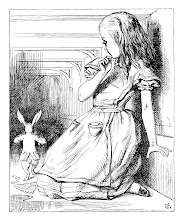 I’ve been a bit slow letting you know my underground activities this week—things have been busy, though actually a little less busy than last week, when I was finishing off the Discovery Class.
I’ve been a bit slow letting you know my underground activities this week—things have been busy, though actually a little less busy than last week, when I was finishing off the Discovery Class. I’m in a really wonderful mood this afternoon—even though my class wasn’t ready to discuss Henry James, we had a really productive session looking through their four page papers on Dead Poets Society. We didn’t get through all of them, but looking at two really in-depth was good. Once again things are being re-arranged—we’ll look at some short papers tomorrow, as well as hopefully the last two Dead Poets responses, and then look through Daisy Miller on Monday. I’m hoping to free up Tuesday and Wednesday for class peer-reviewing, and I’ve given the students extra options with their portfolio: if, having written their four original papers, all around 4 pages, they really hate one, they can discard it and turn another paper into an eight page piece of writing. I told my class, too, about some of the pedagogical articles on the teaching of writing, because I found them useful to thinking about my own writing. They’re really interested in reading them—and the reason I think that this is something very helpful for students is that they make even more explicit the degree to which writing is a process. To teach something, you have to be able to break it down in those process-steps.
Earlier this week I read a draft of my friend Carolyn’s thesis. She’s writing on pedagogies of writing, and one of the things that interested me most what her writing about how experts in other fields approach their work/become experts, and how that may be applied to the writing process. One of her central analogies was to the musician: obviously, with my training, this would appeal. The thing that rang true is the fact that the amateur musician plays a piece from start to finish. Even if they stop to go over where the mistakes might lie and practice those tricky passages a few times, they still “start at the top.” The expert musician will tend to go straight to the problematic parts, and work at the technique. I remember, oh so many times, starting with long tone exercises for maybe half an hour, then an hour or so on the technical parts of playing the flute before maybe allowing a quarter of a two-hour practice session on playing pieces of music… and still rarely from start to finish. I’m less disciplined when I do pick up my flute now, but I have that training, and I know what it means to play at a high level, and I still play through to find where the problems lie and then attack those sections. It’s so interesting. So I talked to my students about this idea, how getting these fundamentals in place allows you to do all the other things: if I can’t get the technique of the flute, putting “interpretation” and “style” on top won’t cover the failure in fundamentals. The basic form of an argumentative essay is, to some degree, a fundamental—getting that in place gives you the opportunity to then have fun with the piece of writing.
I feel like things have been going well, even in the very small class. It doesn’t feel like as much hard work—I’ve gotten better at asking questions, and when we workshopped the longer papers today, I could see the two students whose work we were looking at begin to voice the feedback I would give before I was giving it. I’m really loving this class.
 Earlier this week we’ve look at two short stories and the opening portion of a novel. The first story we looked at was F. Scott Fitzgerald’s “Bernice Bobs Her Hair.” One student came in and asked why everything was so repetitious, but said too that The Great Gatsby was his favourite book. I told him to go home and read “Bernice Bobs Her Hair,” and think about if this was Daisy’s set, 6 years before the action of Gatsby. He came in the next day and said he loved the story. We looked then at two really recent pieces of writing—Nell Freudenberger’s “The Tutor” from Lucky Girls, and the opening chapter of Curtis Sittenfeld’s Prep, to think through what kind of things are set up in the beginning of a story, and how contrasts and oppositions (here, class, race) are set up at the outset of most works. I feel like each student responded to different work, though with such a small number of people it was hard to keep the conversation going all the time. Still, I loved it when a student came in to discuss “Bernice Bobs Her Hair” and said, “It’s just like Mean Girls.” Now I haven’t seen Mean Girls yet, but the trailer told me a lot, and judging by the trailer I agree…
Earlier this week we’ve look at two short stories and the opening portion of a novel. The first story we looked at was F. Scott Fitzgerald’s “Bernice Bobs Her Hair.” One student came in and asked why everything was so repetitious, but said too that The Great Gatsby was his favourite book. I told him to go home and read “Bernice Bobs Her Hair,” and think about if this was Daisy’s set, 6 years before the action of Gatsby. He came in the next day and said he loved the story. We looked then at two really recent pieces of writing—Nell Freudenberger’s “The Tutor” from Lucky Girls, and the opening chapter of Curtis Sittenfeld’s Prep, to think through what kind of things are set up in the beginning of a story, and how contrasts and oppositions (here, class, race) are set up at the outset of most works. I feel like each student responded to different work, though with such a small number of people it was hard to keep the conversation going all the time. Still, I loved it when a student came in to discuss “Bernice Bobs Her Hair” and said, “It’s just like Mean Girls.” Now I haven’t seen Mean Girls yet, but the trailer told me a lot, and judging by the trailer I agree…In other news, one of the Baked and Wired boys, Taylor, invited me to this poetry group last night. So I wandered up to Columbia Heights and found myself having such a great time: reading poems, writing poems. (I feel like my poem is a good basis for a poem, but it is, at the moment, a little too “neat.” Sometimes I think my endings resolve too quickly—like it used to be with my music. I’ve gotten much better with the poems, but it takes work, and twenty minutes last night wasn’t enough. Also, I feel like a bit of research will add something to the mix.) It was such a relief to talk about poetry. I feel like I’ve been so ensconced in teaching, that some of my fundamental activities—reading, writing—haven’t had as much attention as they otherwise would, or as they should. So, I’m going to try to get some more bits of writing happening in the next week, even before class finishes. Then I’ll have another ten days or so to think and laze about and maybe get out of town for a day or two before my parents arrive.
Did I mention that my mother and father are coming out? I haven’t seen them since early January, and Skype conversations don’t quite make up for it. In three weeks I’ll be in the Australian fold. I’m a happy, happy Miss Kate.



























